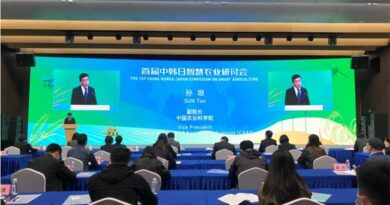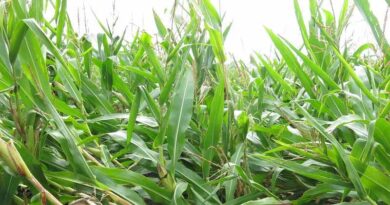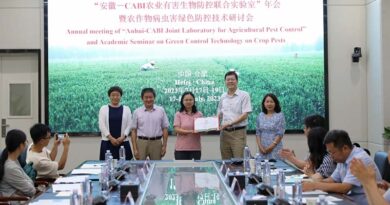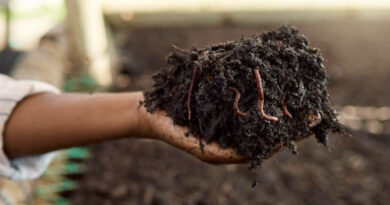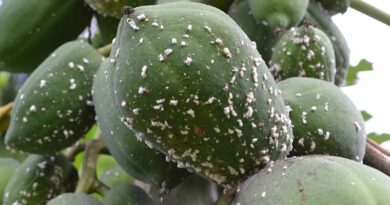CABI shares expertise at FAO’s Global Symposium on Sustainable Fall Armyworm Control
21 November 2023, China: CABI scientists have shared their expertise at the Global Symposium on Sustainable Fall Armyworm Management (GS-FAW) convened by the Food and Agriculture Organization of the United Nations (FAO) in Beijing, China.
Dr Roger Day, Dr Ivan Rwomushana, Dr Hongmei Li and Frances Williams, all contributed to the symposium which was hosted by the Chinese Academy of Agricultural Sciences (CAAS), and the National Agro-Teach Extension and Service Centre (NATESC) of the Ministry of Agriculture and Rural Affairs (MARA).
The GS-FAW, whose theme was “Charting a global response to future invasive pests,” marked the end of FAO’s Global Action (GA) on Fall Armyworm Control.
Global response against the fall armyworm
The aim of the symposium was to facilitate worldwide dissemination of results and lessons learnt to improve the global response against the fall armyworm and other invasive plant pests and diseases.
CABI’s involvement in the symposium came less than a month after CABI and the FAO signed a Memorandum of Understanding (MoU) to work together and improve the livelihoods of 500 million smallholder farmers while easing the global food crisis.
This includes working on complementary extension approaches, such as Farmer Field Schools and plant clinics, which provide information on bioprotection solutions to tackle crop pests, such as the fall armyworm, as part of Integrated Pest Management (IPM).
Previously, CABI worked with the FAO on a field handbook for the identification and management of fall armyworm and, also with the United States Agency for International Development (USAID), on a Training of Trainers Manual for the monitoring, early warning and management of fall armyworm.
Researchers from CABI also found that the parasitoid Eiphosoma laphygmae is likely to be the best classical biological control from the Americas against the fall armyworm which favours maize but affects over 80 other plant species.
CABI is also working with the Zambia Agriculture Research Institute (ZARI) and the University of Zambia (UNZA) is embarking on a project, funded by the Australian Centre for International Agricultural Research (ACIAR), to advocate village-based biological control of the pest.
Fall armyworm remains a major challenge to maize production
At the symposium, Ms Williams, CABI’s Director of Social Services, gave a keynote address with key findings and recommendations on the ‘Impact assessment of the Global Action on Fall Armyworm Control’ in a session moderated by Dr Robert Bertram, Chief Scientist at USAID.
Ms Williams drew from data obtained from surveys conducted in India and Kenya in October and November 2022, at the end of the main maize production seasons, and highlighted that fall armyworm remains a major challenge to maize production.
However, she said infestation and damage levels on farmers’ fields are decreasing with yield loss estimates in India at 5% and in Kenya at 5.5%. She added that Farmer Field Schools and village awareness meetings were helping farmers to use a combination of cultural, mechanical, and biological methods to tackle fall armyworm.
Key to the success of addressing the fall armyworm outbreak was the deliberate and active collaboration between all stakeholders involved in the coordinated response. This lesson should be taken forward to address future pest outbreaks.
Dr Rwomushana then presented on ‘FAW IPM in Eastern and Southern Africa: CABI’s research approaches’ as part of a session – entitled ‘IPM for FAW in its native and invasion range.’
Appropriate IPM strategy
As part of a call to action, Dr Rwomushana said the cost of nature-based solutions for fall armyworm is still high and research towards reducing the cost increasing availability is critical.
He also added that the compatibility of the different methods needs to be understood better to design an appropriate IPM strategy for the farmer.
Dr Li spoke about ‘Innovative technologies for farm advisory with some examples in FAW management’ in a session – chaired by Ms Alia Diyana of Pesticide Action Network Asia and the Pacific (PANAP) and Mr Wang Fuxiang from National Agro-Tech Extension and Service Center (NATESC), China – entitled ‘Farmers and extension.’
She brought attention to a range of CABI programmes and products which are helping smallholder farmers tackle fall armyworm using the power of digital information and data.
Timely data to advise smallholder farmers
Most of the world’s farmers are smallholders, who produce 1/3~1/2 of the world’s food and play an important role in global food security. It is important that the innovative and digital prevention and control technologies are widely accepted and used among smallholder farmers. These include advice given to smallholder farmers through the projects led by CABI and Plantwise plant clinics – such as diagnosis and management – as well as the use of the Fall Armyworm Portal which has a range of information including over 100 practical identification and management guides.
Dr Li also spoke about how the Pest Risk Information System (PRISE) is sending information on the fall armyworm to plant doctors who use this timely data to advise smallholder farmers on how to mitigate the pest.
Finally, Dr Day gave a presentation – during a session on ‘Enabling Environment’ which was co-chaired by Ms Williams – on ‘FAW: Lessons for managing future invasive pests.’
Five lessons learnt
Here he outlined five lessons from the fall armyworm for managing future invasive pests, particularly in the earlier part of an invasion. These included reporting new pests promptly, getting coordinated quickly, giving farmers appropriate advice, maintaining regulatory control of pesticides, and being prepared.
Dr Day said that the 5th lesson – Being prepared – was the most important and would help address the other four lessons. The International Plant Protection Convention’s planned Pest Outbreak and Alert Response System should help preparedness at a global level. At national level pest risk prioritisation can enable countries to focus limited resources on prevention and preparedness for highest risks.
Also Read: Global Fisheries Conference 2023 to be organized in India on 21-22 November at Ahmedabad
(For Latest Agriculture News & Updates, follow Krishak Jagat on Google News)



